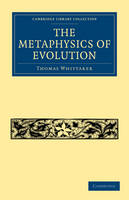
The Metaphysics of Evolution
Seiten
2009
Cambridge University Press (Verlag)
978-1-108-00437-4 (ISBN)
Cambridge University Press (Verlag)
978-1-108-00437-4 (ISBN)
Thomas Whittaker spent over forty years grappling with the question of how metaphysics might interact with science and evolution. This book, published in 1928, is a collection of his essays exploring the topic from the Greek philosophers to the early modern period, and attempting a synthesis of his own.
What conclusions do the facts of cosmic and organic evolution require or permit on the origin and destiny of the world and the individual? From 1881 to 1925 Thomas Whittaker, an Oxford-trained scientist turned philosopher, grappled with this question, which he tried to answer by metaphysical interpretation of the sciences. The majority of the essays in this volume first appeared in Mind, and a few in other journals, while three had not been previously published. Whittaker ranges widely over some of the most daring theories of the past, from the early centuries of the common era (including Apollonius of Tyana and Origen), to the middle ages (including John Scotus Erigena and Nicholas of Cusa), the renaissance (Giordano Bruno, Shakespeare) and the early modern period. Whittaker's own view is that hypothesis and imagination are legitimate aids in the search for truth in both science and philosophy in a new synthesis.
What conclusions do the facts of cosmic and organic evolution require or permit on the origin and destiny of the world and the individual? From 1881 to 1925 Thomas Whittaker, an Oxford-trained scientist turned philosopher, grappled with this question, which he tried to answer by metaphysical interpretation of the sciences. The majority of the essays in this volume first appeared in Mind, and a few in other journals, while three had not been previously published. Whittaker ranges widely over some of the most daring theories of the past, from the early centuries of the common era (including Apollonius of Tyana and Origen), to the middle ages (including John Scotus Erigena and Nicholas of Cusa), the renaissance (Giordano Bruno, Shakespeare) and the early modern period. Whittaker's own view is that hypothesis and imagination are legitimate aids in the search for truth in both science and philosophy in a new synthesis.
Prologue; Part I; Preface to the first part; 1. A critical essay on the philosophy of history; 2. 'Mind-stuff' from the historical point of view; 3. Giordano Bruno; 4. The musical and the picturesque elements in poetry; 5. On the nature of thought; 6. Philosophical antinomies; 7. Giordano Bruno and his time; 8. The problem of causality; 9. Science and idealism; 10. Correspondence; Part II; Preface to the second part; 11. Apollonius of Tyana; 12. Celsus and Origen; 13. Origen as philosopher; 14. John Scotus Erigena; 15. Nicholas of Cusa; 16. Animism, religion and philosophy; 17. A compendious classification of the sciences; 18. Teleology and the individual; 19. A new metaphysic of evolution; Appendix.
| Erscheint lt. Verlag | 24.9.2009 |
|---|---|
| Reihe/Serie | Cambridge Library Collection - Darwin, Evolution and Genetics |
| Zusatzinfo | Worked examples or Exercises |
| Verlagsort | Cambridge |
| Sprache | englisch |
| Maße | 140 x 216 mm |
| Gewicht | 630 g |
| Themenwelt | Geisteswissenschaften ► Philosophie ► Metaphysik / Ontologie |
| Naturwissenschaften ► Biologie ► Evolution | |
| Sozialwissenschaften | |
| ISBN-10 | 1-108-00437-7 / 1108004377 |
| ISBN-13 | 978-1-108-00437-4 / 9781108004374 |
| Zustand | Neuware |
| Haben Sie eine Frage zum Produkt? |
Mehr entdecken
aus dem Bereich
aus dem Bereich
Buch | Hardcover (2024)
Matthes & Seitz (Verlag)
CHF 41,90


